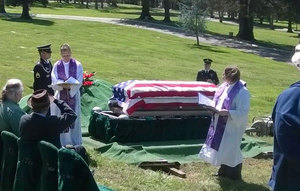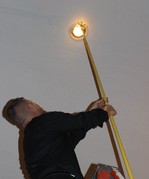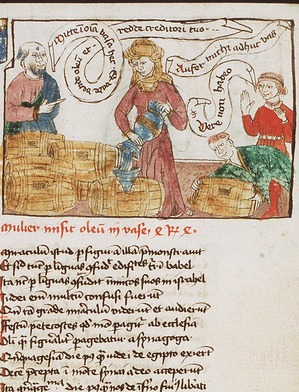Are you here looking for the living among the dead? That question, so poignant and yet so confusing at first, particularly to the first listeners who heard it from the two shining men standing in the tomb.
These listeners, three women coming to deal with the body of a loved one in the customary manner among their people, are shocked and surprised, having found out that the body of the man who they sought, Lord Jesus Christ, was nowhere to be found? Who took it? Where did it go? What monster would do such a thing as making our loved one vanish in such a manner?

These wonderful witnesses to the resurrection, three ordinary women who followed Jesus in his life and loved him and were so devoted to him so as to be there for him to see to the respectful disposition of his remains, while it must have been a fright for them to encounter these two people in the tomb, people in shining glorious raiment, and yet it was quite a blessing indeed for them to have been there at that moment, the first of many who would witness as to the majesty and glory of the risen Christ.
Luke does not call these men they encounter angels, we may expect that is who they are, although it may also bring to mind Moses and Elijah who were in a similar condition at Christ's transfiguration, these two men offer such a poignant, yet important question to the women, "Why do you seek the living among the dead?" Why do you seek the battered body of Jesus here, when he has risen as he told you?
This sole question says so much. It reminds the women of the promise that Jesus gave them, that he would be handed over to sinners, that he would be executed in the most humiliating manner of the time, and that he would rise again, that Jesus Christ was, in fact, not counted among the dead but raised up to heaven to be seated with God, and that his glorious resurrection came about in order that they also may be saved from the bondage of death at the end of their days.
Why do we seek the living among the dead? We have come together to say goodbye to our friend, father, brother and uncle, Charles Ralph Pagter Jr., and have come to remember his life, and indelibly scribe his image in our minds. This man, who we at LCC knew as Charles or even Charlie, who I knew in my short time here as someone who made it Sunday worship as often as he could, taking the bus from his home. Charles who always joined us at coffee hour afterwards, who reliably provided the youngsters with coloring books and other toys.
And yet Charles who also went by his middle name Ralph had, in his 89 years quite a bit of history, having left home at 18 to join the Army, after having some struggles in his home life, understood the struggles that many youth face today, and always had an open heart for the underprivileged, the ones who were rejected from society, who needed to know that they were cared for and appreciated and on someone's mind, and Charles Ralph was someone who felt that with an open heart. And Charles Ralph was someone who lived for others.
And even as he just missed participating in World War 2, he left the army and pursued a degree in engineering, and wound up with the United States Postal Service for a long and illustrious career, during which time he met and married, Alice Mae Dahl, right here in this building when it was Bethany Lutheran Church, and they had their beloved son who was brought up and baptized here. And for his family, Charles Ralph lived.
Charles very much loved his home of Albany and Berkeley, so much that he spent the rest of his life here once he settled here right after his Army service, and was involved in both the church community as well as the other organizations he loved like the postal unions and the local VFW and was a lifelong supporter of the Democratic Party. And for his country and the issues that he loved, Charles Ralph lived.
Why do we come looking for the living among the dead? Charles Ralph's life was evidence that he lived for life, and that he truly loved life. Even as we have come together to say goodbye to Charles Ralph, I cannot help but to acknowledge that even as he lives in our memories and our hearts, he is also very much alive in the arms of God in heaven. We hold our memory of his conversations with us, whether we knew him by his family, whether by his work, whether at either of his two congregations, Shepherd of the Hills or Lutheran Church of the Cross. He lived for all these things and yet he lives again in Christ.
There is a real truth in the resurrection that we find a tragedy of the crucifixion of Jesus Christ which becomes transformed into the victory of the reign of God at the resurrection. That wondrous, glorious itself is a promise to each and every one of us that God's victory saves each of us from the shackles of death and the grave, and that even as Charles Ralph is reunited with his beloved wife Alice Mae, once more, that all of us who loved him will also encounter Charles Ralph again. Why do we seek the living among the dead? We know because of the boundless love of our God who has mercy on each of us, that when we finally seek Charles again, we will find him, alive, in good health, and basking in the richness of God almighty.
Amen.






